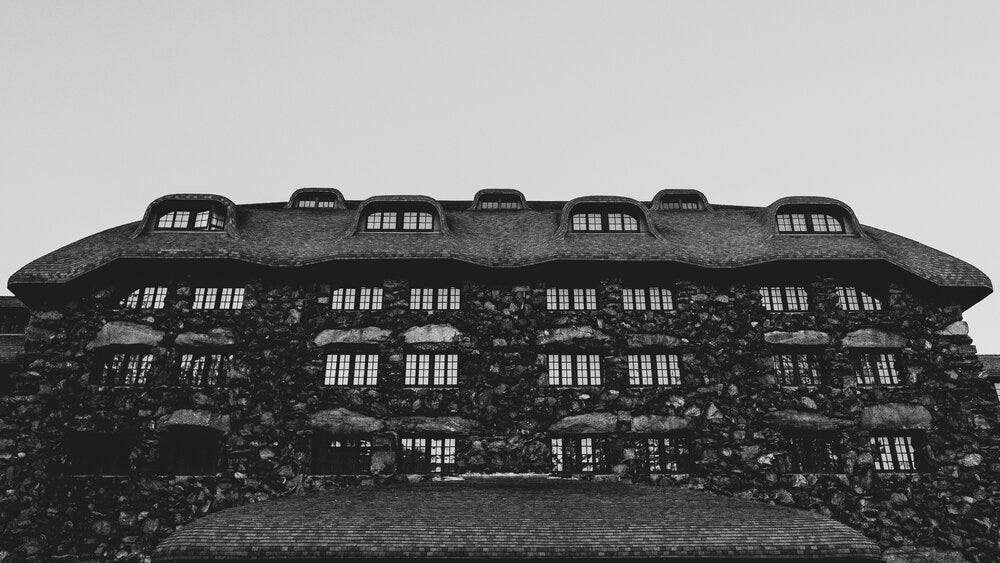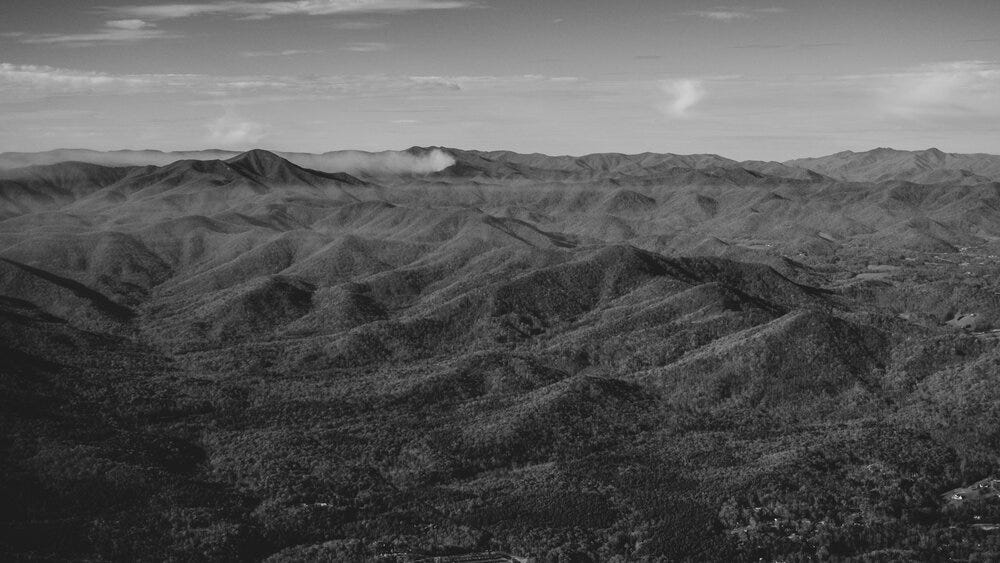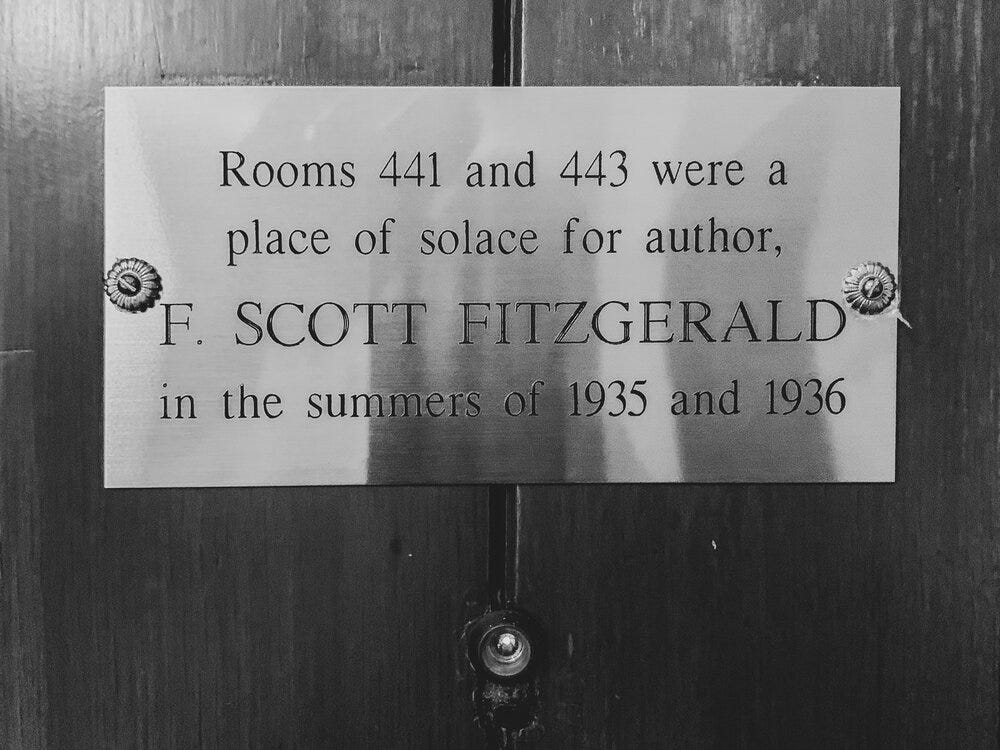Closing Time in America
In a famous three-part essay for Esquire in 1936 written during the most miserable period of his life, F. Scott Fitzgerald wrote that “all life is a process of breaking down,” a series of both external and internal “blows” whose cumulative effect can be destructive of self-incurred illusion. One of those blows for Fitzgerald was the deterioration of his wife Zelda’s mental health, which led to her committal to a sanatorium in Asheville. Holed up in two rooms at the Grove Park Inn, Scott Fitzgerald experienced his own protracted “dark night of the soul,” drinking up to forty bottles of beer a day and carrying on with married women, absorbed in the ever-contracting world of his own troubles. He distilled the intensity of that experience into the trio of essays that became known collectively as “The Crack-Up.”
I experienced, if not quite a crack-up, certainly a moment erosive of the accumulated silt of assumption and ignorance, at the northeast corner of Sumter County at Andersonville, the site of a notorious Confederate prison camp during the Civil War. It was the first in a series of disruptions to received knowledge that would, over the next twenty years, unravel the story of the world that I had been taught.
Fitzgerald’s experience is a lot closer to home to me now than it was even on that first trip to Andersonville. I now live a few hundred yards from where the hotel room in which he lost it in 1936 is now marked with a brass plaque, somewhat disingenuously, as “a place of solace for the author.” Behind the house of my next-door neighbors once stood the carriage house where Scott’s over-worked secretary, Laura Guthrie Hearne, lived and silently bore the burden of his daily workload along with his obsessions, neuroses, and a come-on or two.
The educational program that was attempted upon me in high school did not remember Andersonville but it did include Fitzgerald’s The Great Gatsby, whose luminous closing line is as justly celebrated as it was innocuous: “So we beat on, boats against the current, borne back ceaselessly into the past.” Whatever past Fitzgerald was referring to, my education did not bear me back into it in any real sense. In its self-aware profundity, Nick Carraway’s closing line hung there for a minute, and then bore itself back to precisely nowhere.
Fitzgerald’s great novel is ostensibly about “the American Dream” and is regularly touted as “the great American novel.” But the highballing, gin-soaked romanticism of West Egg remains as remote from the reality of most American lives as Scott and Zelda Fitzgerald, she in her white knickerbocker suit and he clad in abject mechanical incompetence, must have seemed to the incredulous garage owners from New York to Montgomery who serviced their injury-prone Marmon 34 daily on a doomed road trip from Manhattan to Zelda’s hometown in Alabama. Shortly after they were married in 1920, in pursuit of biscuits and peaches unavailable in New York, they set out with a plan to surprise Zelda’s parents, only to find the door to her childhood home locked, her parents away in Connecticut to surprise them.
Fitzgerald told the story in a series of essays later collected as The Cruise of the Rolling Junk. The tale is less about the world in which he and Zelda find themselves than an attempt to see America through the prism of their own elitist sensibilities and dashed hopes. In one way, the story is an account of the failure of the reality of the road trip to live up to expectations, and a moving instance of seeking out an imagined past only to find it bolted shut to us; in another, it is about the failure of everyone else to live up to the Fitzgeralds’ image of themselves. The tale of a Jazz Age Heloise and Abelard, Cruise is Fitzgerald’s winsome and lightweight historia calamitatum: a story of Scott and Zelda’s misfortunes, but no one else’s.
Unlike the closing image of Gatsby, Cruise does not pretend to bear us back into any past. The romantic past of Fitzgerald’s Gatsby found literary expression in the sentimental vision of Manhattan, “the old island here that flowered once for Dutch sailors’ eyes—a fresh, green breast of the new world.” It had little to nothing to do with the underside of official American history and the prices paid by native and enslaved peoples for the securing of that “last and greatest of all dreams.” The subject didn’t seem to take for him even when and where it might have had the best opportunity to impact him, in the South in 1920.
What Scott and Zelda were looking for on the road then was not deep historical understanding. Fair enough—they were young and starry-eyed and looking for a good time. And regularly high as a Zeppelin. If American culture in 1920 desperately needed an exposé of its own darkness and hypocrisy, the Fitzgeralds were probably not the ones to deliver it. And while the Cruise is entertaining and occasionally profoundly eloquent, under the pressed-linen elegance of Scott’s prose is a sometimes embarrassing bigotry and naiveté about the fraught and unkempt world through which he and Zelda seem to course with such insouciant lightness. In one instance early on in the book, Scott waxes dreamily about the South to which they are headed, and, in a metaphor revealing for its obliviousness, pines for a “land where happiness hung from a tree.”
Cruise is astonishing for its evident lack of curiosity about the region, its history, its people. Scott is—unsurprisingly, perhaps—dismissive and condescending about the “surrounding yokelry” and especially local African-Americans, whom he regards with pompous repulsion. When he pops into a gas station near Richmond, Fitzgerald finds himself “enclosed in a miasmatic impression which left on me a vivid and unforgettable impression.” The room, he writes, “was simply jammed with negroes,” and “the moral and physical aura which they cast off was to me oppressive and obscene.”
The detachment from the realities of history and of life in Cruise—and arguably in much of Fitzgerald’s work—is epitomized by the glance given off by Zelda after one of the Rolling Junk’s innumerable mishaps, in D.C. She stood off to one side, drained of her youthful exuberance, “measuring the distance between herself and the nearest onlooker.”
Read backward from “The Crack-Up,” Cruise presages the bleak disappointment Fitzgerald would experience in the distance between his ambitions and the reality of his life, and by extension the distance between American fantasies of innocence and the realities of American history.
When John and I took our own meandering road trip through the South for the first time in 1997, it was entirely outside of Fitzgerald’s influence. That tour and the four that followed it over the next several years, eventually amounted to the kind of slow-burn internal blow that Fitzgerald diagnosed in himself, which would ultimately undo my own delusions. But unlike him, I did not come to believe there was nothing I could do about it. We went back twenty years later, to see what we had missed the first five times around.
In the meantime, I had experienced a much more Fitzgerald-esque crack-up of my own, which led to my own divorce from alcohol in 2011. By the time we returned to the road in 2018, I was more prepared to see the South—and my own history—as a more sober person. That summer when I filled the cooler in the back of the minivan with sparkling water and not Miller High Life, I had become able to see it not as a disappointment, but as a very modest yet real sort of freedom. I had enjoyed drinking, and thought I was pretty good at it—the spirited conviviality, the bonhomie, and, frankly, the temporary relief from the relentless refusal of life to let up for a moment. I was, of course, desperately wrong about all that, but mostly wrong about what I thought quitting drinking would cost me, and blind to what leaving it behind would enable me to see.
Regaining sight was less like scales falling suddenly from my eyes than like seeing through a residual haze that would eventually burn off in persistent, dogged sunlight. One of the shadowy figures that first appeared was the ideal of American mobility, and when it took shape and came into clearer light itself, it appeared this time as an illusion. I had been raised to believe in America as the great historical anti-Thebes, where fate had been unseated from its ancient dominion, where one can be whatever one wants, wherever one wants. It also became clear that this realization was not simply an intellectual one: I had participated in it myself, ending up with a job in a state I had no real connection to and did not want to die in. My wife and I decided to return to the southeast, a region that had claimed us both, the bearing of whose history and culture upon my own self I could no longer ignore. Within a couple of years of the crack-up, without really knowing either the fact or the meaning of it, we were living in Scott Fitzgerald’s shadow.

If The Great Gatsby can be called the Great American Novel—or even one of them—what is it about the book that makes it so quintessentially “American”? Despite its apparent final move toward the past, the prehistory of Gatsby remains a fantasy, and the central obsession of the protagonist—as, arguably, with Fitzgerald, and with America generally—is with oneself. Gatsby’s most quintessentially American quality is overwhelming hollowness, the incapacity of glittering, sequined dreams to conceal what James Baldwin called “probably the world’s most bewilderingly empty way of life.” Fitzgerald himself seemed as averse as his own characters to serious—not self-flagellating— introspection. As with Fitzgerald, so with his, and our, America. If the present is any indication, resistance to honest self-criticism is almost impossibly sturdy in a nation so congenitally averse to patient self-examination. If a crack-up is coming, it could be a while.
Fitzgerald’s “Crack-Up” is mainly remembered for his remark that “the test of a first-rate intelligence is the ability to hold two opposed ideas in the mind at the same time, and still retain the ability to function.” The essay contains moments of both painful honesty and convenient silence about the ravaging effects of alcoholism, but Fitzgerald stops short of naming his own personal demon. Having suffered a booze-induced crack-up of my own, I know what he is not talking about. But the essay as a whole reads like a self-indulgent attempt by a pathologically insecure writer to convince himself that he is, after all, a first-rate intelligence. As in his ill-fated “cruise” through the South, Fitzgerald was capable of both high lyrical art and utter obliviousness to himself and American history at the same time.
I do not know whether it would have helped Fitzgerald for his sense of calamity to have been expanded beyond the confines of his own solipsistic sense of despair, to realize that the world he inhabited was far darker and more hopeless for those less white and less privileged than himself. It would have taken more than a rational argument, though, to bring Scott around: intellectual propositions would have availed little against the severe alcoholism which afflicted and ultimately killed him. But had he been able to see clearly for a moment—to see himself where he was—he might have come to realize that one of the jarring contradictions that he missed was that between the isolation of his literary art and its world from the culture of American life in the Jim Crow South of the 1930s.

This obliviousness, however, is arguably what makes Fitzgerald so quintessentially American.
“American-ness” is certainly no stable essence, and cannot really be defined with the kind of specificity that might satisfy a social scientist. But it is possible that the Fitzgerald of “The Crack-Up” is far more useful than Gatsby for thinking what constitutes “American-ness.” Most of us were taught a version of The American Story as a tale of original innocence, occasionally waylaid by failures to live up to our highest national ideals. If one were to attempt seriously to think “American-ness” as a thing, it would require “the ability to hold two opposed ideas in the mind at the same time”—to think of America as a fundamentally conflicted land and idea and polity, an ideal whose origins are not only far from innocent but born in theft and violent conquest, a contested land whose soil is an admixture of rich, fertile minerals and spilt blood, whose landscape is a tableau of indescribable beauty and profligate waste, and a polity whose future demands its citizens be “ceaselessly borne back into the past”—not the wishful past just of the solitary self, but the unsettling past that we can not simply opt out of. That past is nonetheless ours for everyone still willing to be claimed as part of the American “we.”
It is not simply that American history has been rife with imperfect people; it is that, abetted by self-congratulatory myths about noble purpose, a lust for domination is at the core of who and what America is. More than that, yes, but not less. Like Zelda in D.C., America’s restless paranoia about itself is often reflected in a pathological need to measure the distance between ourselves and our onlookers, and convince ourselves of how vast that difference is. Like Fitzgerald in his darkest hours in Asheville, America remains myth-drunk with itself, as if our salvation consisted in simply repeating to ourselves over and over again, at ever-higher volume, that we simply are what we most like to think we are.
As anyone who has struggled with alcoholism knows, recovery demands an unceremonious and daily vigilance against the ever-present wolf of delusion at the door. From all appearances America is, one hopes, at the tail end of a destructive addiction to fanciful myths about its own innocence and superiority. Talk of “recovery” is, in the future aftermath of the coronavirus, no longer a hypothetical abstraction. On the other side awaits either dissolution or some form of rickety renewal. In the meantime, the convulsive spasms of defensive power-lust only tend to disguise a radical anxiety (white) America appears to be having about itself, a deep and untouchable insecurity that maybe we are not the greatest nation in the world after all.
Chipping away at those illusions will inevitably occasion fevered outbursts of denial and self-justification. Among other things, America is “a bundle of lies and contradictions,” to borrow Bill Mallonee’s words from The Killing Floor, the record that first taught me about Andersonville. If nothing else, my experiences attempting to reckon with Southern history and culture and my own place in it have taught me how those contradictions can co-exist with one another truthfully, and not without hope. It is not a question of reconciling contradictions between the American ideal and the American reality; it is more basic than that: getting contradictions in the same room together, around the same table, if only to sit in silence together for a while. For a nation that has arguably never really been morally sober, this may be too much to ask.
Even in the midst of his own “crack-up,” Fitzgerald did not think all was lost. He was thinking mainly of his own literary career and reputation when he wrote it, but whatever future there might be for America might just require one, or all, to “be able to see that things are hopeless and yet be determined to make them otherwise.”
Alcohol contributed to the deaths of several family members and to the demise of two grandparents, and my own crack-up allowed me to imagine myself as no different, as vulnerable to the same addictions and self-delusions as anyone else. Alcohol can be deadly, yes, but my own divorce from alcohol left me to contend with the more pernicious addictions that can really kill every one of us: pride, envy, wrath, falsehood, despair. Especially the despair that things cannot be otherwise.





